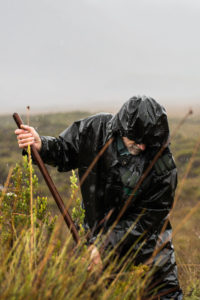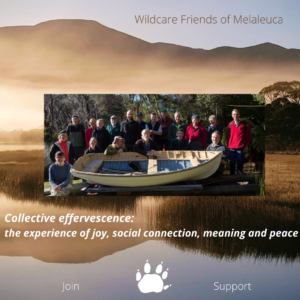Volunteering, wonder and well-being
An article published this week by The Impact Suite summarised the findings of a recent study that investigated the volunteering habits, mental health, and distress function of 70,000 research participants over an 18 year period.
The study was conducted in the United Kingdom and published in the peer reviewed ‘The Journal of Happiness Studies‘.
The findings will come as no surprise to Wildcarers:
- People who had volunteered in the past year were more satisfied with their lives and rated their overall health as better.
- Those who volunteered more regularly (at least once/month) reported better mental health and higher levels of life satisfaction than others in the sample set.
The study also revealed that:
- People that help others experience a “warm glow”of satisfaction.
- Volunteering helps people stay connected to one another, especially for older adults in retirement and
- Volunteering builds opportunities and skills –especially in younger adults. These include opportunities for leadership, networking, and other professional skills in the 16-24 and 55-74 age brackets.
And there is an added bonus!!
In an attempt to make the benefits of volunteering more tangible, researchers compared it to the effects on people’s income. They discovered that if someone earned an average wage, volunteering was “worth” approximately$1,100AU. That’s just like getting a $1,100 bonus!
Combine these benefits with those of working with others in nature, and you could probably double your money, or at least, your well-being!
In her book ‘Phosphorescence’, Julia Baird writes about the value of experiences of awe and wonder that bring people into the present moment and sites studies conducted by social psychologists suggesting that people who regularly feel awe are more likely to be generous, helpful, altruistic, ethical and relaxed.
In one case, writes Baird, people who spent time staring up at towering eucalypts were more inclined to help someone who had stumbled and dropped a handful of pens than those who had not. In other words, when dwarfed by an experience, we are more likely to look to one another and care for one another and feel more connected.
In 1912, French sociologist Emile Durkeim, introduced the term ‘collective effervescence‘ – to describe an experience of connection, communal emotion and a ‘sensation of sacredness’ that happens when we are part of something bigger than us. More recent research has found ways to measure what we all probably recognise – that these experiences contribute a sense of meaning, an increased sense of social connection and a decreased sense of loneliness.
We at Wildcare concur, and believe that our volunteer groups provide the opportunity to feel connected to something bigger than ourselves; an opportunity to feel joy, social connection, meaning and peace – all while contributing to a healthier planet. Now that’s well-being – in spades!
Check out Edition 63 of Wildtimes and join one of our monthly ‘Welcome to Wildcare’ Zoom Info sessions to find out how we do it.
We’d really love to hear your own experience of how volunteering benefits you. Please share your story with us by writing to memberservices@wildcaretas.org.au
The Impact Suite is a social enterprise committed to helping Australia’s charities and not-for-profit organisations be more effective and sustainable.
(Feature photo ‘Stars and torches north west’ by Andy Johnson)



